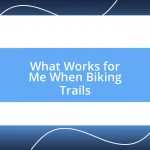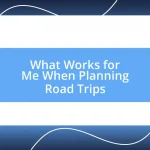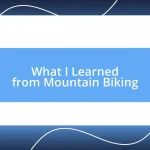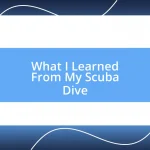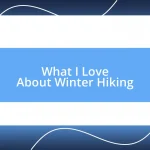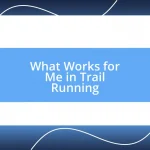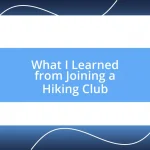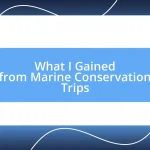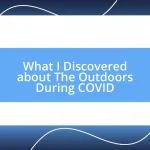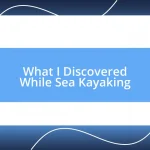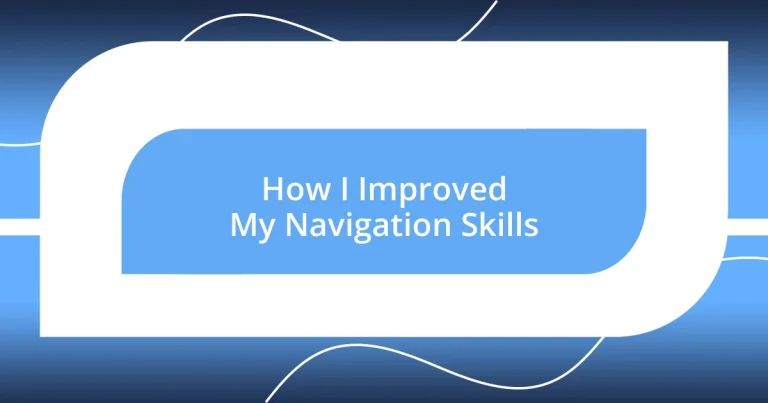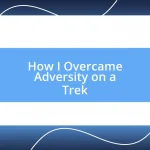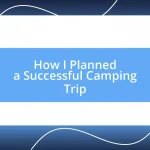Key takeaways:
- Practicing mindfulness and being aware of surroundings enhances navigation skills beyond just using technology.
- Engaging with real-life navigation challenges builds confidence, intuition, and fosters a deeper connection with the environment.
- Reflecting on progress allows for growth recognition, turning each misstep into a valuable learning opportunity.
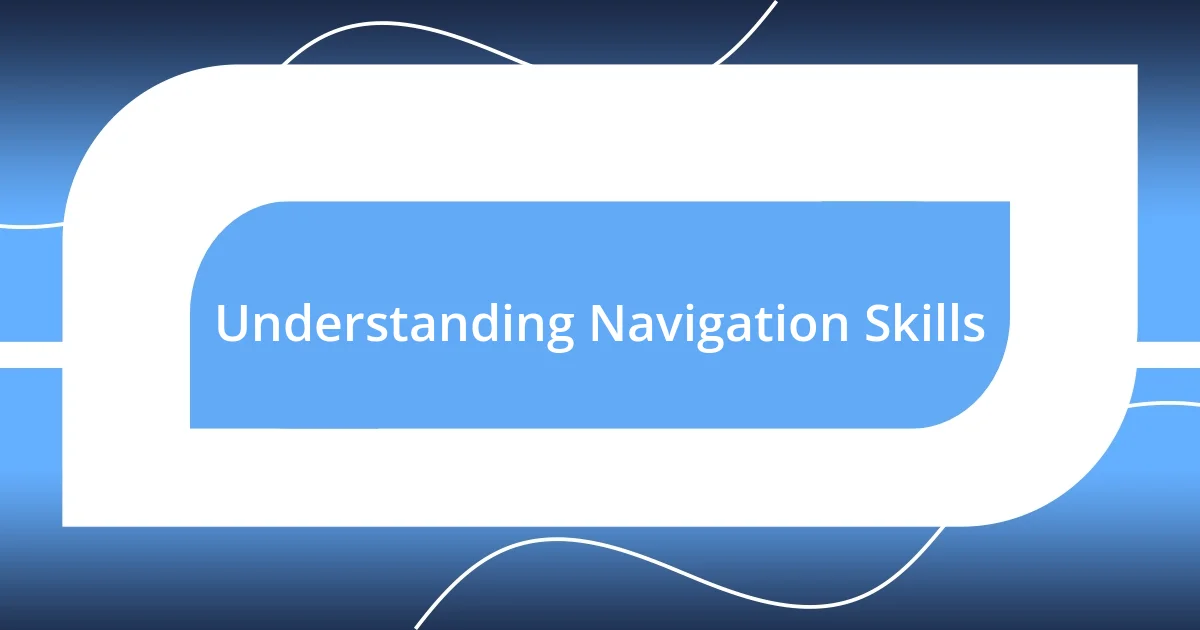
Understanding Navigation Skills
Understanding navigation skills is about more than just reading a map. For me, it’s the blend of spatial awareness and the ability to interpret the world around us. I still remember getting lost during a road trip, relying on a paper map, and feeling that mix of frustration and disorientation. Have you ever faced that unsettling moment when you realize you’re not where you thought you were?
There’s a fascinating connection between our brains and how we navigate. I’ve discovered that practicing mindfulness while exploring new places can enhance my navigation skills significantly. The awareness of my surroundings became sharper; suddenly, I was not just a passenger but an active participant in my journey. Isn’t it empowering when you start recognizing landmarks and building mental maps?
Another crucial aspect is how technology intersects with navigation. Smartphones have made it easier than ever to find our way, but is there a risk of becoming overly reliant on them? I recall a hiking trip when my phone died, and I had to rely on my instincts and the environment. Trusting my gut led me to a breathtaking view I would have missed if I had just followed a digital route. That experience taught me that true navigation is as much about intuition as it is about using tools.
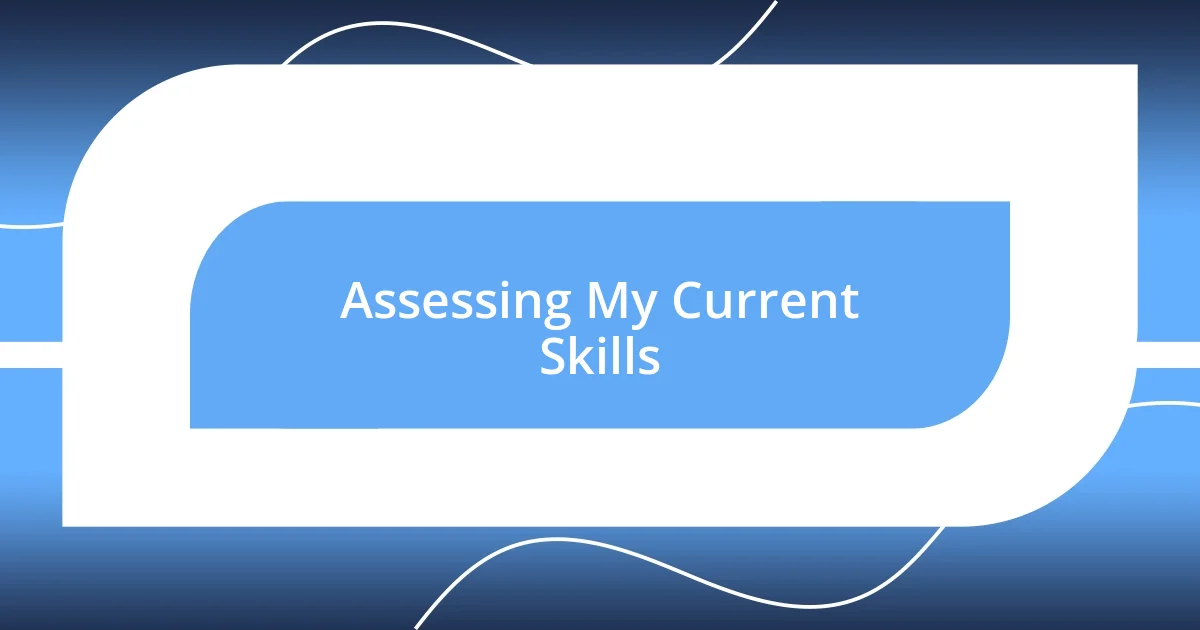
Assessing My Current Skills
Assessing my navigation skills required an honest look in the mirror. Initially, I wasn’t very confident. I often found myself second-guessing my instincts and relying heavily on GPS. In addition, I recognized I had a tendency to overlook my surroundings, which sometimes left me feeling unprepared and anxious in unfamiliar areas. Do you ever feel that disconnection when trying to figure out where you are?
To better understand my starting point, I decided to create a comparison of my skills over time. Reflecting on past experiences illuminated how I’ve grown but also highlighted areas still needing improvement. For instance, in the past, I would frequently miss key visual cues because I was absorbed in my phone. Now, I strive to be more aware of my surroundings. Do you think tracking progress is helpful for developing any skill? For me, seeing the changes has been incredibly motivating.
It was eye-opening to assess how much I relied on technology as opposed to my own capabilities. One time, I took a wrong turn in a city I thought I knew well, which spiraled into quite the adventure. I eventually found my way, but not before stumbling upon a quaint café that turned out to be a hidden gem. This experience reaffirmed my belief that an occasional detour can reveal amazing opportunities, emphasizing that self-assessment can lead to unexpected growth and learning.
| Aspect | Previous Skill Level | Current Skill Level |
|---|---|---|
| Map Reading | Basic | Intermediate |
| Spatial Awareness | Poor | Improving |
| Technology Reliance | High | Moderate |
| Confidence in Navigation | Low | Growing |
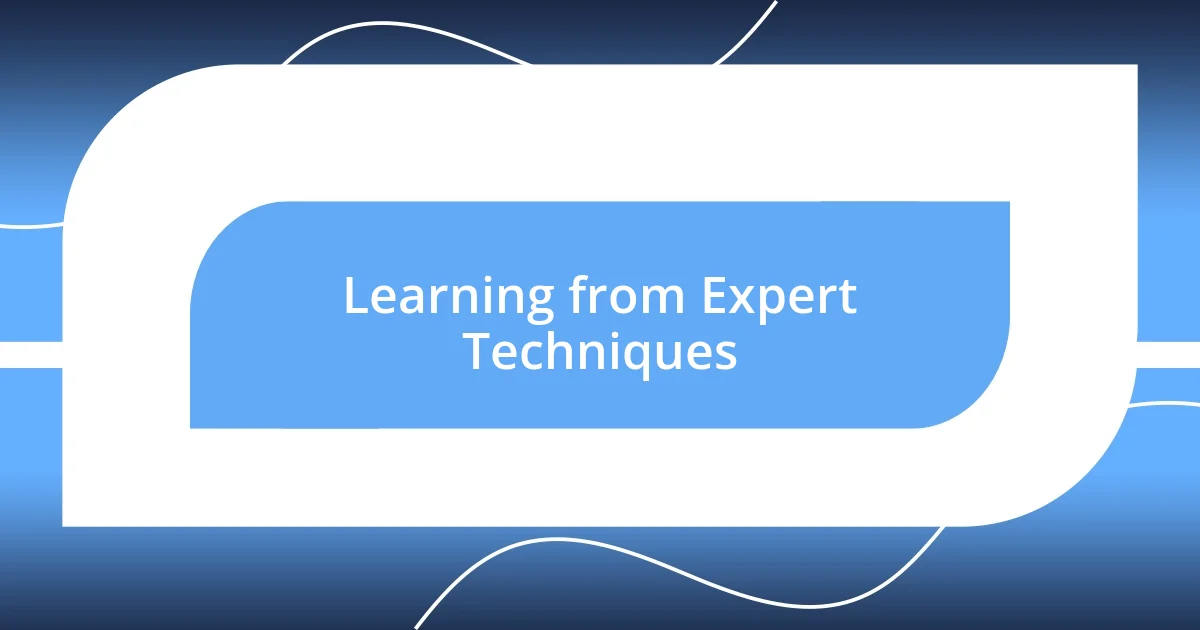
Learning from Expert Techniques
Learning from experts has been a game changer in my journey to sharpen my navigation skills. I realized that studying how seasoned navigators approach their routes provided me with invaluable techniques. For instance, I once attended a workshop led by a renowned outdoor guide who emphasized the importance of “reading the terrain.” His ability to analyze natural markers and predict routes inspired me to look beyond conventional navigational tools.
- Practice makes perfect: Regularly take walks without devices to strengthen your instincts.
- Study local maps: Explore the area on a map before you go out—this mindset can improve your spatial awareness.
- Engage with seasoned navigators: Learn from their experiences; their stories can offer insights you may never have considered.
Incorporating expert methods into my practice, I grew more versatile and confident. I distinctly recall one session where a navigation pro shared her knack for using the stars to find direction. I ventured out at night, and looking up at the constellations was both humbling and exhilarating. This shift in perspective invited me to see navigation as a dynamic skill set rather than a fixed ability; exploration itself became a teacher, urging me to connect with my surroundings on a deeper level.
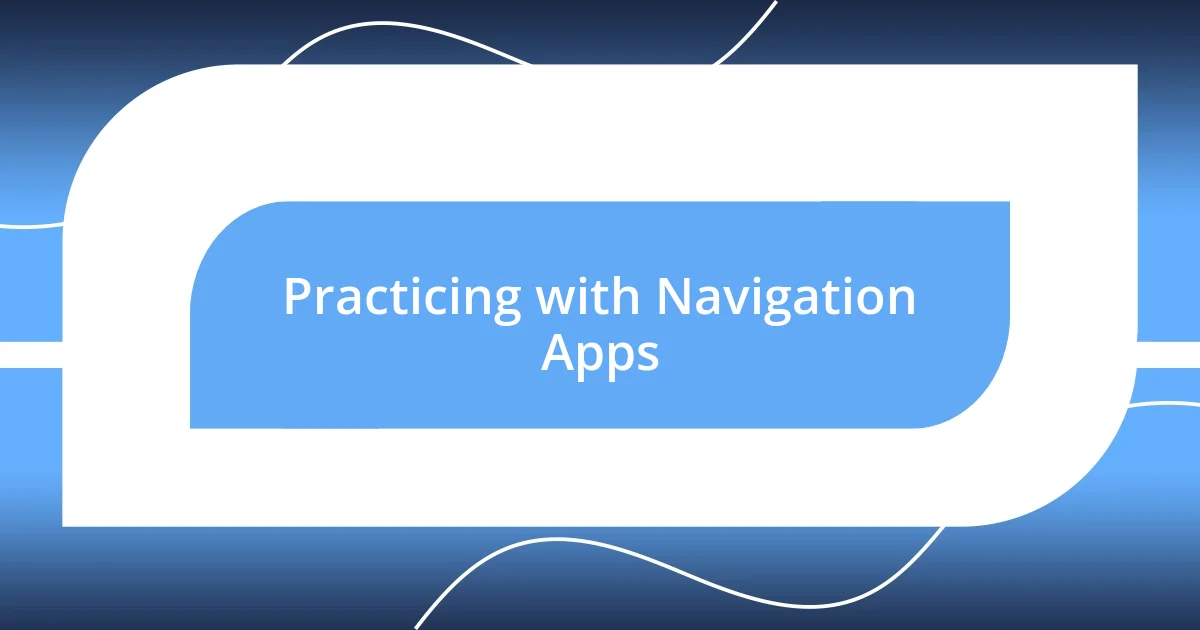
Practicing with Navigation Apps
Utilizing navigation apps has been an integral part of honing my navigation skills. Initially, I viewed them as a crutch, something I relied on too heavily. However, I soon realized that these apps can teach you so much if you engage with them actively. For example, I began to familiarize myself with features like alternate routes and estimated travel times. Have you ever taken the time to study these details? I found that doing so enhanced my understanding of how geography affects travel.
As I practiced with these apps, I started to integrate what I learned into real-life scenarios. When I planned a recent road trip, I used an app to examine various routes based on traffic patterns and scenic views. By doing this, I wasn’t just letting the technology guide me; rather, I was learning to anticipate situations on the road. It felt empowering to know I was gaining the skills to make informed choices, even if the app was still there for back-up.
I found that a fantastic way to build my confidence was to challenge myself by using navigation apps in offline mode. This meant I had to rely on my notes and memory to navigate without the internet. It was a bit intimidating at first, but those moments when I successfully made it to my destination felt exhilarating! I realized that practicing with navigation apps doesn’t just make you dependent on technology; it can also build your intuition and problem-solving skills. Have you ever tried going off the grid? The experience can be surprisingly liberating!
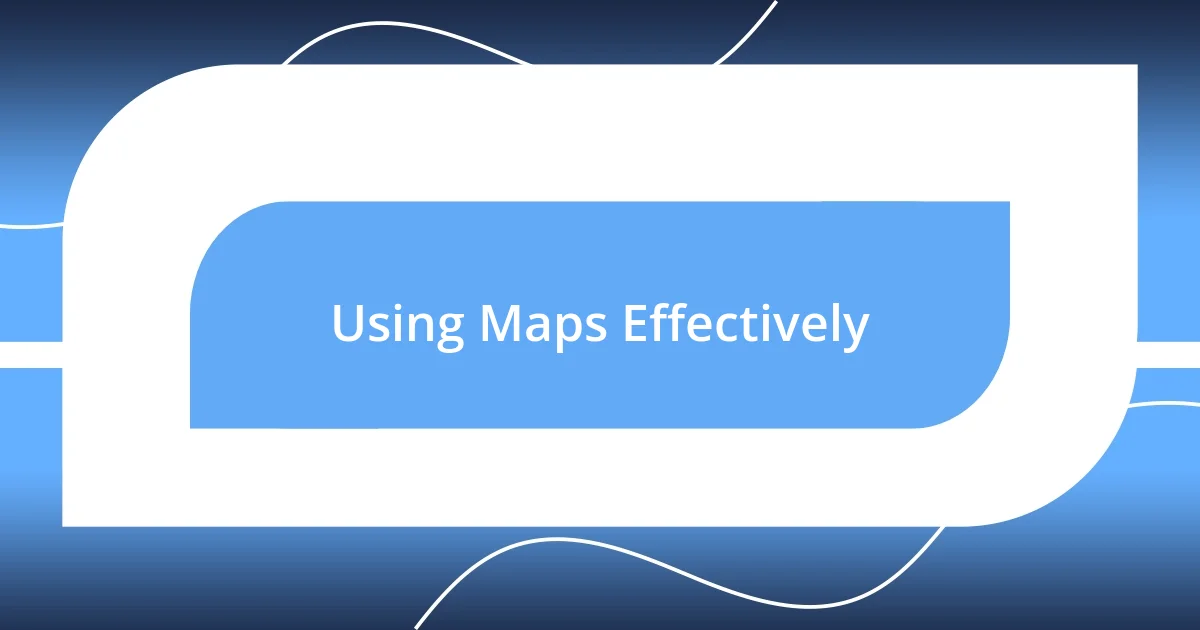
Using Maps Effectively
Using maps effectively transformed the way I approached navigation. I remember an afternoon spent poring over a detailed topographical map of a hiking area I planned to explore. The contours and elevation lines sparked a sense of excitement within me. Have you ever felt that thrill? By visualizing the terrain and understanding how steep the inclines were, I was able to strategize my hike, choosing a route that fit my abilities while still offering a challenge.
During my explorations, I discovered the importance of not just glancing at a map but truly engaging with it. There was a particular instance when I took a wrong turn because I skimmed over crucial details. Learning from that mistake, I now take time to mark key locations, like water sources or potential campsites, directly on my map. This small practice not only boosts my confidence in the wild but also makes it an enjoyable ritual, like creating a treasure map of my adventure.
I also recall a weekend trip where I deliberately left my phone behind and relied solely on physical maps. I felt a tinge of anxiety at first—what if I got lost? But as I unfolded that paper map and traced my finger along the route, a sense of empowerment washed over me. Each curve and symbol became a piece of the story I was about to live. That experience taught me that maps aren’t just tools; they’re an invitation to engage with the world around me in a more meaningful way. Have you given yourself the chance to explore with just a map? It’s a refreshing shift that deepens your connection to your surroundings.
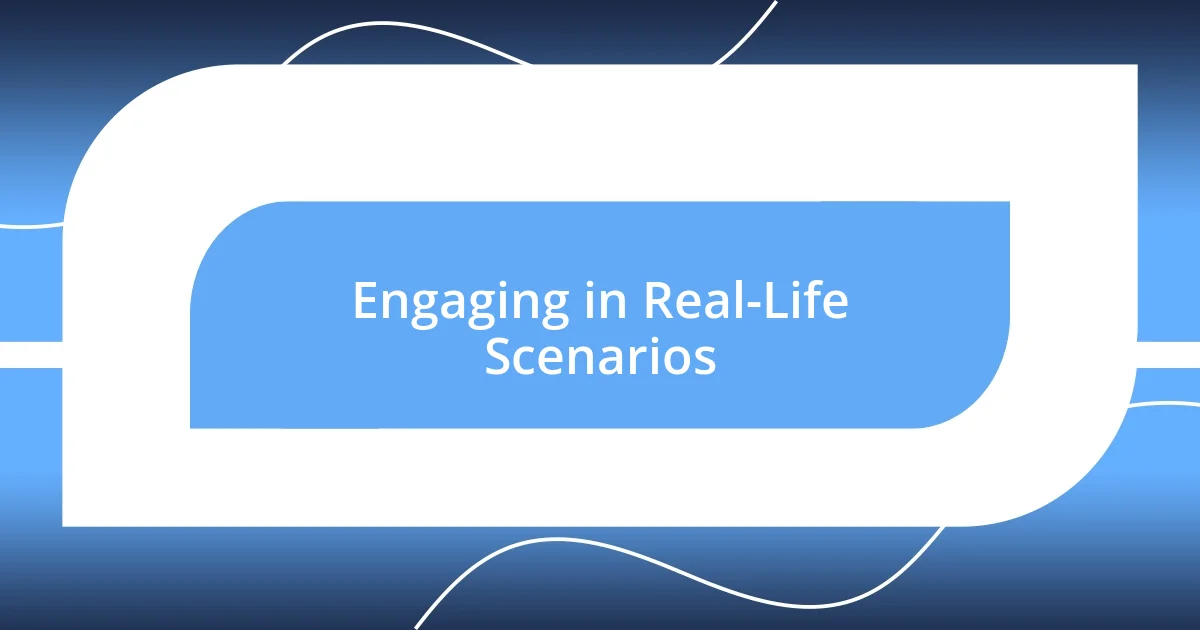
Engaging in Real-Life Scenarios
Engaging in real-life scenarios has been one of the most exciting ways I’ve improved my navigation skills. I vividly remember one afternoon during a city exploration trip. Armed with only a paper map, I set out to locate a hidden gem café I had heard about. At first, I was nervous, recalling the comforting glow of my phone’s GPS—but this challenge turned out to be exhilarating. Each turn I took felt like a mini-adventure, and with each success, my confidence grew.
There was an occasion when I joined a local hiking group that emphasized less reliance on technology. Instead of simply following the trail markers, we were tasked with reading the environment—following the sun, understanding elevation changes, and recognizing landmarks. It was like stepping into a treasure hunt, where the prize was the satisfaction of navigating accurately, without assistance. Do you remember the last time you felt truly connected to your surroundings? That day, I learned to listen to nature, guiding my path based on the textures of the landscape, and it felt incredibly liberating.
I also took to volunteering for a community event that involved organizing a city-wide treasure hunt. My navigation skills were put to the test as I guided a group through winding streets and local parks. This was different; I wasn’t just navigating for myself—I was responsible for a team! The pressure pushed me to think on my feet, adapt quickly, and communicate effectively. Have you ever faced a situation that seemed daunting but ultimately made you feel so alive? Seeing the joy on my teammates’ faces as we found each clue was an unforgettable reward, reinforcing the idea that real-life navigation enriches not only my skills but also my connections with others.
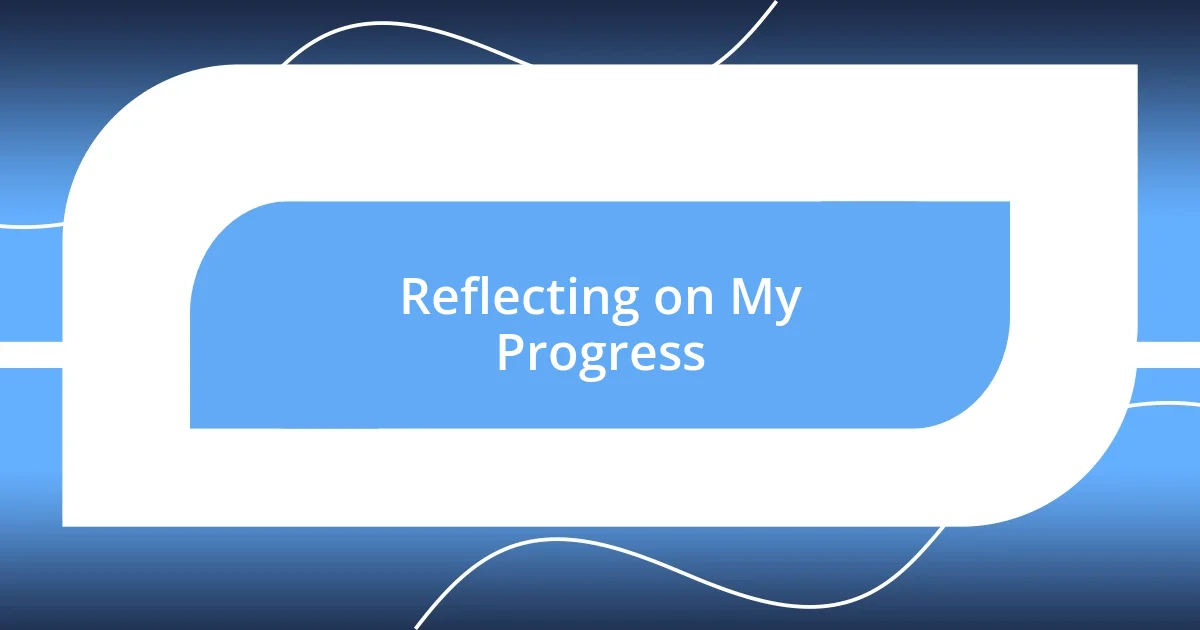
Reflecting on My Progress
Reflecting on my progress, I’ve come to appreciate just how far I’ve come in my navigation journey. I recall a time when I would often feel overwhelmed, unsure whether I was headed in the right direction. Now, I can look back on those moments with a sense of pride, knowing that each misstep was a valuable lesson. Have you ever stumbled only to find that you’ve grown from the experience?
One highlight was the shift in my mindset. I remember standing at a crossroads during one of my hikes, filled with doubt about which path to take. Instead of panicking, I took a deep breath and relied on what I had learned—analyzing the surroundings, recalling my map’s details, and trusting my instincts. It was empowering to realize that I had cultivated this knowledge through intentional practice. Isn’t it incredible how challenges can reveal our true capabilities?
Now, reflecting on my most recent navigation experience, I feel an exhilarating blend of confidence and excitement. On a spontaneous outing to a new state park, I ventured off the beaten path. The lush greenery and rustling leaves enriched the journey as I confidently mapped my route in my mind. I wasn’t just wandering; I was exploring with purpose. How often do we allow ourselves the freedom to explore without a strict agenda? It’s in those moments of exploration that our navigation skills truly shine.

